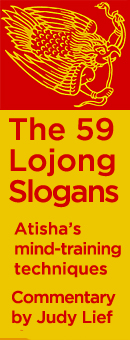The Mind-Training Slogans, Slogan #38

Each Friday, Acharya Judy Lief, teacher in the Shambhala tradition of Chogyam Trungpa Rinpoche, comments on one of Atisha’s 59 mind-training (Tib. lojong) slogans, which serve as the basis for a complete practice.
Atisha (980-1052 CE) was an Indian adept who brought to Tibet a systematized approach to bodhicitta (the desire to awaken for the sake of all sentient beings) and loving-kindness, through working with these slogans. Judy edited Chogyam Trungpa’s Training the Mind (Shambhala, 1993), which contains Trungpa Rinpoche’s commentaries on the lojong (“mind-training”) teachings.
Each entry includes a practice.
Read all the lojong slogans here.
38. Don’t seek others’ pain as the limbs of your own happiness.
It is embarrassing realize how much of our own happiness seems to be based on the suffering of other beings. Even worse, we find that at times we go so far as to hope that someone else suffers, because we know that we will benefit from their pain. We hope that someone else will lose, so that we can win. We develop a kind of dog-eat-dog, or your-pain-my gain mentality.

This slogan is about exploitation. It is about taking advantage of others in order to maintain our wealth and privilege. It could also be applied to our attitude to our mother earth. It is about the habit of take take take, with no gratitude, and with blindness as to the consequences.
When we recognize the extent to which we base our own happiness on the pain of other beings, our so-called happiness is threatened. It begins to ring hollow. So we cover up this reality in a cloud of vague ignorance. We act as though our good fortune is simply our due and has nothing to do with any one else’s problems or suffering. But often, in fact, the two are inextricably interconnected.
According to this slogan, if our happiness is based on the suffering of others, if that is the only way to maintain it, it cannot be true happiness. Our so-called happiness is both tainted and flimsy. So once again, as in so many other slogans, the habit of putting ourselves first and looking out for number one is shown to be a completely dysfunctional approach. It is a false hope, a phony and a fraud.
Today’s practice
Whether you think of yourself as privileged or as underprivileged, contemplate the effect of buying into the paradigm that increasing your happiness depends on decreasing the happiness of others.
Home image: dakman
Thank you for subscribing to Tricycle! As a nonprofit, we depend on readers like you to keep Buddhist teachings and practices widely available.